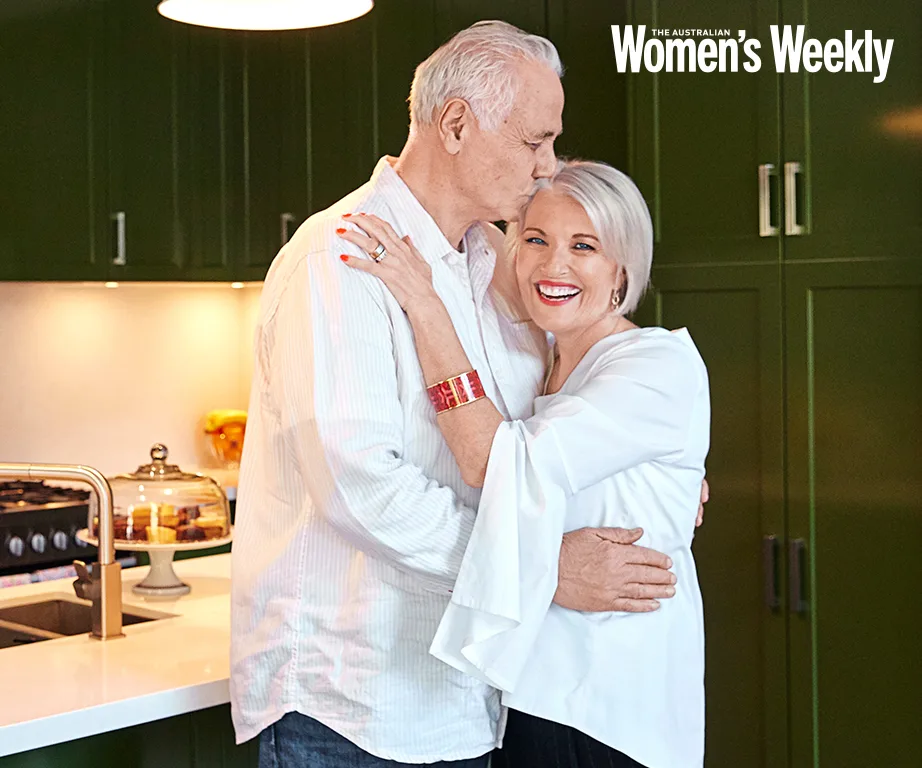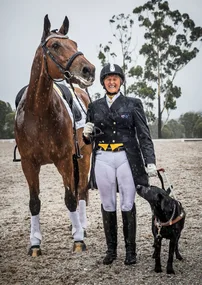
Libby Lyons has a lot in common with her late grandmother, the legendary Dame Enid Lyons, a feisty Tasmanian with a passion for politics and the welfare of women. Dame Enid’s much-loved husband, Prime Minister Joseph Lyons, died at 59, leaving her to manage 11 children and her own burgeoning political career. She went on to become a columnist for The Australian Women’s Weekly, and the first Australian woman elected to the House of Representatives and the Cabinet.
“My grandmother was an amazing, formidable woman,” says Libby, who is proving a formidable force as Director of the Workplace Gender Equality Agency and, like Dame Enid, battled to lift herself out of grief and depression following the death of a much-loved husband. The examples set by the women in her family helped Libby rebuild her life.
Libby was born in Devonport in Tasmania. Her mother was a special education teacher and her father (like his famous parents) a politician. When Libby was 10, he resigned as Deputy Premier, bringing down the government and precipitating allegations (never proven) of corruption. Amid the chaos, the family moved to Melbourne.
“Politics is tough on family,” Libby admits. “Partners and children pay a price. Dad was never anonymous. My grandmother was never anonymous. There was always someone wanting a piece of them.” Yet life wasn’t boring. “There was always chatter and laughter, and people staying for dinner. Politics was discussed and that was very much a focus for the family.”
Libby remembers visiting her grandmother in Devonport. “I have vivid memories of sing-alongs around the piano. She played the piano, painted, she loved cooking and gardening, and was a beautiful writer.
She wrote three books and regular columns.” Dame Enid was also a great orator. Former Prime Minister Robert Menzies famously claimed she could move him to tears over the condition of a railway track. “She maintained her interest in politics until the day she died,” says Libby. “My grandmother was a strong, together, with-it woman right to the end.”

Enid Lyons with one of her books.
Dame Enid described herself as “a bit of a rabble-rouser”, but Libby remembers her grandmother was confounded by ’70s feminism. “I think she found that early, Germaine Greer-type movement rather crude and she never considered herself a feminist. The whole ‘burning your bra’ thing – my grandmother was beside herself about that, as was my mother. But both those women brought me up to believe I could do whatever I wanted in life. Mum always said, ‘You have the world at your feet. Explore it’.”
How financially literate are you? Take the quiz to see how much you know about your personal finances. If you’re looking to sharpen your finance knowledge, be sure to check out Bauer’s Financially Fit Females hub.
Family life
Libby did. After university, she found her way into IT and then the resources industry. Working in London, she met Michael Jones, a Crown Prosecutor and fellow Aussie. He had a passion for life, a social conscience and a sense of humour. “He was a friend of my sister,” Libby remembers. “We all had dinner. A week later, he asked me out, three weeks later we were engaged.”
Libby had been working in the UK for nine years when she became pregnant. The young couple wanted to offer their son “the sort of lifestyle we’d had growing up”, so they headed home. They moved to Perth, then Broome and Darwin, where Michael ran Aboriginal Legal Aid and Libby managed a program to put internet connections into remote communities.
“It was a wonderful time,” Libby recalls, “and especially for [our son] Charlie. We went fishing on weekends, always watching for crocodiles. There were waterfalls and swimming holes, Mindil Beach markets in the dry season, laksa for breakfast at Parap Markets. Darwin’s such a melting pot.
“There was a lovely Indonesian lady called Mariana who looked after Charlie when we were working. She had four children of her own and he became like her fifth. He grew up eating Indonesian food and speaking bits of Indonesian. I’d walk through town with Charlie and people would say hello to him, and I’d have no idea who they were. One time, it was the Indonesian Consul. Michael would be proud that he still doesn’t see colour. People are people to Charlie.”
When Charlie was seven, they moved to Melbourne “and Michael took a couple of years off work to be a full-time father. He was a vivacious, positive, warm person, with lots of energy, and he loved it.” He started a basketball team at the school. He had morning coffee with the mums. “With all that happened, it was the most wonderful thing for Charlie – that he could have this time with his dad.”
In 2004 the family moved back to Perth. This time it felt like home. Libby took a job with Western Power, Michael worked as a barrister and Charlie commuted to boarding school in Melbourne. The resources industry boomed, the Western Australian sun shone brightly, for six years life seemed simple – until suddenly it wasn’t.
“It was all very quick,” Libby says, softly. “Michael had been complaining about his eyesight and I kept saying, ‘Go to the optometrist’. What I hadn’t appreciated was that it wasn’t just a problem with seeing print. He was also having trouble deciphering words.”
Michael’s GP referred him for an MRI and warned Libby that if anything unusual happened in the meantime, she should take him to Emergency. The following night, Michael woke with a headache that grew worse. Libby drove to the hospital. “They took Michael for a CT scan and, while he was away,” she remembers, “I just sat in a cubicle and cried.”
The scan detected a large glioblastoma. The brain tumour was found to be particularly aggressive. Doctors suggested that even with treatment and surgery, Michael was unlikely to survive more than six months. Seven years later, tears are never far from the surface as Libby recounts how their life unfolded over the 11 weeks that followed.
Losing Michael
“Michael didn’t want treatment,” says Libby. “He wanted to spend whatever life he had left with us and with friends, and to make the most of it. Charlie had returned from school to be with his dad, so the three of us talked about it and that was our decision. Michael stayed home initially. He wasn’t sleeping much. He’d get up at three in the morning and do things like getting all the recipes we’d collected over the years and putting them in a folder and writing funny comments on them. He brought precious things together from his life and Charlie’s grandparents’ lives, and he made a folder of precious memories for Charlie. He did wonderful things.
“After about six weeks, Michael wanted Charlie to go back to school and … I hate talking about this,” Libby says, quietly scrambling for a tissue. “This was the worst moment of my life. A child should never have to say goodbye to their parent, but they were fantastic because they both have wonderful senses of humour and were so warm … Charlie went to school and six hours later, Michael went into hospital and he never came out.”
At first, Libby says, “we had some lovely nights together in the hospital, where I would take in food and music. Then, very quickly, he went downhill.” Charlie had said he wanted to be there when his dad died, so Libby called him home and Michael died three days later. He was 54. “He was in a good place,” Libby says. “It was as painless as it could be.”
After Michael’s death, Charlie went back to boarding school and Libby kept working and travelling at a frantic pace. “I hadn’t stopped since the diagnosis,” she admits. Then the shock and grief caught up with her. “I think the hardest thing to come to terms with is that you lose your dreams. You don’t think about that when someone is dying, but our dreams were bound together. So when Michael died, my dreams died with him.”
Libby was diagnosed with depression. The family dog, Scruff, could have diagnosed her weeks earlier. In the mornings, he would sit by Libby’s bed and implore her to get up when all she wanted to do was “pull the duvet over my head and go back to sleep”. In the evenings, Scruff would wait by the door for Michael. “But he got over it. In time, we both did. Scruff saw me through.”

Libby and Scruff, who helped her get through the hard times.
Then, the unexpected happened. Twelve months later, Libby and Charlie were in Argentina and a friend invited them to dinner. Libby sat beside George Bowen, an English academic and businessman, and something of a silver fox. They were locked in conversation all night. Afterwards, Libby said to Charlie, “George is nice, isn’t he?” And Charlie replied, “I think he’s a sleaze.” Libby laughed.
Libby and George sent emails back and forth over the following year, then there was a holiday in Greece. George moved to Australia and he and Libby were married in January 2014.
“I asked Charlie if he would give me away,” says Libby, smiling. “He looked at me and said, ‘Too right I will’.” Charlie and George have become great friends. Libby was then approached by the Workplace Gender Equality Agency, the organisation tasked with closing the gender pay gap in private business – no small task. At present, the gender pay gap in Australia is hovering around 16 per cent, which means the average Australian woman earns $261.30 less each week than the average man.

Libby and second husband George Bowen, whom she met at a dinner in Argentina.
A new passion
“With every job I’ve taken,” Libby says, “I’ve been lying in bed the night before, thinking, ‘What have I done? Have I bitten off more than I can chew?’ I don’t think men do that. But I get over it and I hit the ground running, and mostly things work out well.”
This job came with an added pressure. “I always thought there was something that I was going to do that would be special, and for me this is that special job,” explains Libby. “I’m passionate about this because, in reducing the gender pay gap, we can improve people’s work and family lives. To fix this, we need more women working and to give more men and women the opportunity to work flexibly. It’s about opportunity and choice.
“The male-dominated industries of resources and construction are declining and the female-dominated areas of education, health care and social assistance are growth industries. If Australia is to continue moving in the direction of positive growth, we have to embrace the growth industries – men, too – that will involve challenging behaviours, stereotypes and the gendered pay scales that go with them.”
With hindsight, Libby believes her career would have been easier (and perhaps more lucrative) if she’d been a man. “I know things happened to me that wouldn’t have happened if I was a bloke,” she says. She’s determined to challenge the attitudes and behaviours that created that workplace culture. “That’s why this job is special to me,” says Libby. “I can’t walk past an injustice, in an office or anywhere – that’s certainly a trait that comes from my forebears.




